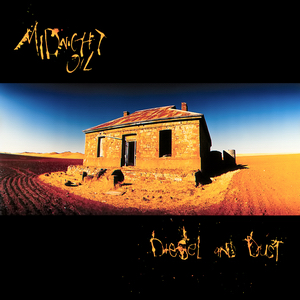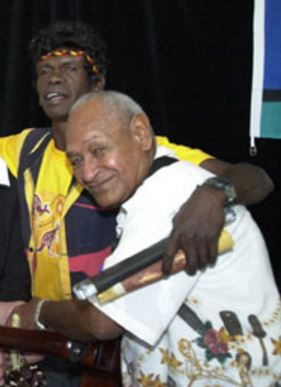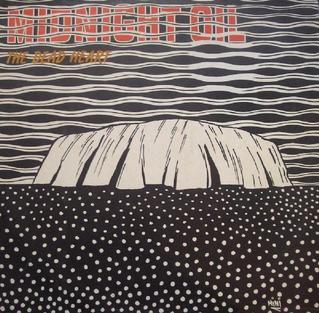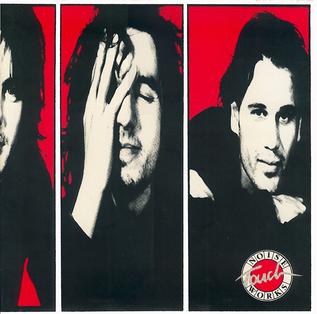
The music of Australia has an extensive history made of music societies. Indigenous Australian music forms a significant part of the unique heritage of a 40,000- to 60,000-year history which produced the iconic didgeridoo. Contemporary fusions of indigenous and Western styles are exemplified in the works of Yothu Yindi, No Fixed Address, Geoffrey Gurrumul Yunupingu and Christine Anu, and mark distinctly Australian contributions to world music.

Midnight Oil are an Australian rock band composed of Peter Garrett, Rob Hirst (drums), Jim Moginie and Martin Rotsey (guitar). The group was formed in Sydney in 1972 by Hirst, Moginie and original bassist Andrew James as Farm: they enlisted Garrett the following year, changed their name in 1976, and hired Rotsey a year later. Peter Gifford served as bass player from 1980 to 1987, with Bones Hillman then assuming the role until his death in 2020. Midnight Oil have sold over 20 million albums worldwide as of 2021.

Diesel and Dust is the sixth studio album by Australian rock band Midnight Oil, released in August 1987 by SPRINT Music label under Columbia Records. Diesel and Dust was produced by Warne Livesey and the band. It is a concept album about the struggles of Indigenous Australians and environmental causes, issues important to the band. It drew inspiration from the Blackfella/Whitefella Tour of remote Indigenous communities with the Warumpi Band and Gondwanaland in 1986. The album peaked at No. 1 on the Australian Kent Music Report Albums Chart for six weeks.

Change the Weather is the second album released by Underworld, in 1989. It contains the single "Stand Up", which became the band's biggest US hit, peaking at number 69 on the Billboard Hot 100 and number 14 on the Alternative Songs chart in 1989. The album peaked at number 64 on the Australian albums chart in October 1989.
Warumpi Band were an Australian country and Aboriginal rock group which formed in the outback settlement of Papunya, Northern Territory, in 1980. The original line-up was George Burarrwanga on vocals and didgeridoo, Gordon Butcher Tjapanangka on drums, his brother Sammy Butcher Tjapanangka on guitar and bass guitar, and Neil Murray on rhythm guitar and backing vocals. Their songs are in English, Luritja and Gumatj. Their key singles are "Blackfella/Whitefella" (1985), "Sit Down Money" (1986), "My Island Home" (1987) and "No Fear" (1987). The group released three albums, Big Name, No Blankets (1985), Go Bush! (1987) and Too Much Humbug (1996). From late 1987 to mid-1995 the group rarely performed as Murray focused on his solo career. In early 1995, Christine Anu, issued a cover version of "My Island Home". Warumpi Band regrouped before disbanding in 2000. Burarrwanga died on 10 June 2007 of lung cancer, and Gordon Butcher died in early 2020 of unreleased causes.
Blekbala Mujik are an Australian rock, reggae group formed in Barunga, Northern Territory in 1986. They fused rock and reggae with a pop, dance sound and have support base for their live shows and recordings. They are cited in the World Music: The Rough Guide as next best known to Yothu Yindi. The band sings in English and in Kriol. At the ARIA Music Awards of 1996 their album, Blekbala Mujik, was nominated for Best Indigenous Release.

George Rrurrambu Burarrwanga, known in life as George Rrurrambu and George Djilangya, was known as the frontman of Warumpi Band, an Aboriginal rock band.

Noiseworks are an Australian hard rock band formed in Sydney in 1986 with bass guitarist Steve Balbi, guitarist Stuart Fraser, drummer Kevin Nicol, keyboardist Justin Stanley and lead vocalist Jon Stevens. They had four Australian Top 10 albums, Noiseworks (1987), Touch (1988), Love Versus Money (1991) and Greatest Hits (1992). They produced three Top 10 singles, "Take Me Back", "Touch" and "Hot Chilli Woman" before disbanding in 1992. Reunion tours occurred in 1999, 2004, 2007–2008, 2011, 2013. The band later reformed in 2016 and in August 2022, released "Heart & Soul"; their first new song in 30 years. Noiseworks' fourth studio album, Evolution was released in November 2022.

"My Island Home" is a rock song written by Neil Murray for George Burarrwanga. It was originally performed by the Warumpi Band. The song references lead singer's home up at Elcho Island off the coast of Arnhem Land in the Northern Territory. It was recorded in 1986 and released as a single from their second album, Go Bush!, in January 1987.
Neil James Murray is an Australian musician, singer-songwriter-guitarist and writer. He was a founding member of the Warumpi Band which was the first major influential Aboriginal rock group with mostly Indigenous members. Murray was recognised as one of Australia's foremost songwriters at the APRA Awards of 1995 by winning Song of the Year for "My Island Home".

"Great Southern Land" is a song by Australian rock band Icehouse. It was released on 9 August 1982 as the lead single from their second studio album Primitive Man. It peaked at No. 5 on the Australian Singles Chart, it was later featured in the 1988 Yahoo Serious film Young Einstein, and remains their most popular songs according to listeners of Triple M in 2007.

Airbourne are an Australian hard rock band formed in Warrnambool, Victoria, in late 2001. Founding members are Joel O'Keeffe on lead vocals and lead guitar, his younger brother Ryan O'Keeffe on drums and David Roads on rhythm guitar and backing vocals. They were joined by Justin Street on bass guitar and backing vocals in mid-2004. Roads amicably left in 2017, Mathew Harrison joined in 2018 and after a short tenure was replaced by Jarrad Morrice on rhythm guitar and backing vocals in mid-2022, who was replaced in turn by Brett Tyrrell in mid-2023.
The Second Australian Recording Industry Association Music Awards was held on 29 February 1988 at the Sheraton Wentworth Hotel in Sydney. Cliff Richard was the host, with Bryan Ferry, Feargal Sharkey and Ian "Molly" Meldrum included as presenters of the 21 awards. Other presenters were Rudi Grassner, Col Joye and Richard Wilkins. There were no live performances and the awards were not televised. A shouting match developed between manager Gary Morris, accepting awards for Midnight Oil, and former Countdown compere Meldrum who was presenting.

"The Dead Heart" is a song by Australian rock band Midnight Oil. It was first released as a single in Australia in 1986 and in the United Kingdom and the United States in 1988 after it had been included on the 1987 album, Diesel and Dust. It peaked at number four on the Australian singles chart and at number 11 on the U.S. Mainstream rock chart.

Touch is the second studio album by Australian rock band Noiseworks. It was released by CBS Records on 14 November 1988.

"Blackfella/Whitefella" is an Australian rock song written by Neil Murray and George Rrurrambu, recorded by their Aboriginal rock group, Warumpi Band, and released as the second single from their 1985 album, Big Name, No Blankets on Parole Records and Powderworks Records. While not a chart success, the song drew attention to issues of racism in Australia through lyrics that encourage harmony and co-operation by people of all races. The song received national airplay and attention in 1986 when politically charged rockers and Powderworks Records founders Midnight Oil accompanied the band on a free concert tour of remote Aboriginal communities as the Blackfella/Whitefella Tour.

"Joey" is the ninth track from American alternative rock band Concrete Blonde's third studio album, Bloodletting (1990). The song was released in 1990 and was written and sung by the band's frontwoman, Johnette Napolitano. The song was written in a cab on the way to a photo studio in Philadelphia; it was the last vocal recorded on the album due to Napolitano's reluctance to record the lyrics, which were hard for her to deal with.

"Solid Rock" is a song written by Shane Howard and recorded by Australian rock band Goanna. The song deals with issues of land rights for Indigenous Australians and was released in September 1982 as the lead single from the band's debut studio album, Spirit of Place. "Solid Rock" peaked at number 3 on the Australian Kent Music Report.

"The Best Thing" is a song by Australian band Boom Crash Opera. It was released on 27 November 1989 as the third single from their second studio album, These Here Are Crazy Times! (1989). The song was featured in the 1991 film Don't Tell Mom the Babysitter's Dead and was included on its soundtrack album.

Too Much Humbug is the third and final studio album by Australian band, Warumpi Band. It was released in 1996. At the ARIA Music Awards of 1996, the album was nominated for Best Indigenous Release.
















